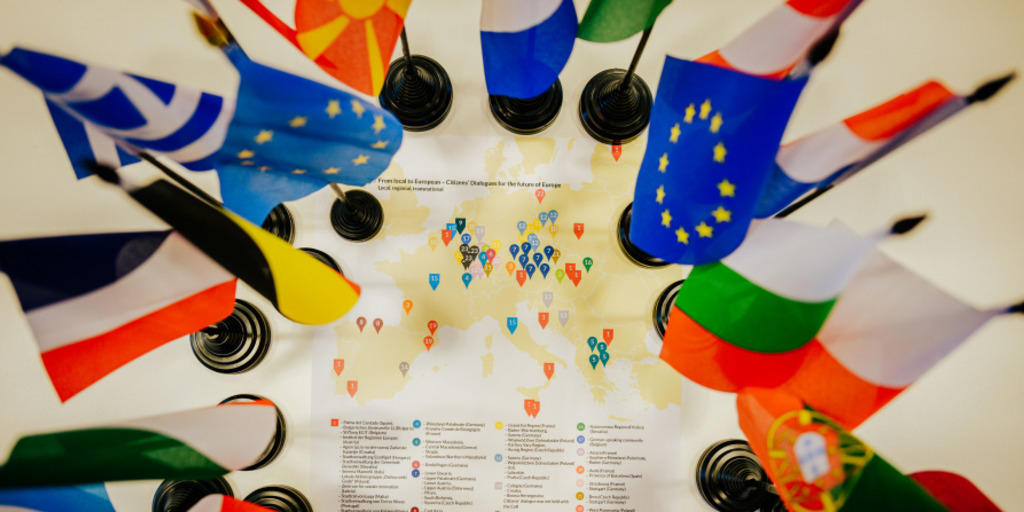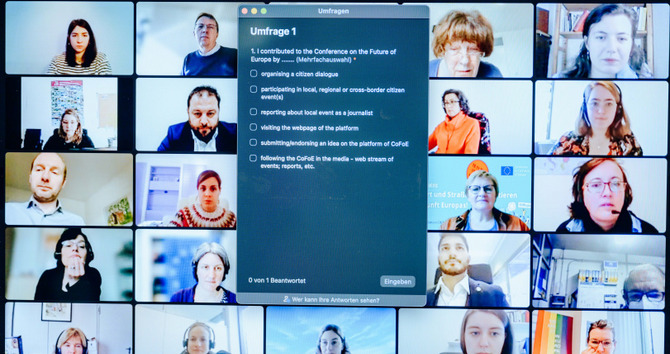For about a year, the Bertelsmann Foundation and the European Committee of the Regions have been working on giving European citizens a voice in the context of the Conference on the Future of Europe. In our live discussion “From local to European – success stories and the main findings from local, cross-border and transnational Citizens’ Dialogues” citizens, experts, and politicians from all over Europe together reflected on the common project and its final evaluation report.

© Besim Mazhiqi
The genie is out of the bottle – Citizens’ Dialogues for the future of Europe
Citizens from Spain, civil society from Poland, politicians, and members of public administrations from Croatia, Germany, Belgium, the Netherlands, Italy, the Czech Republic, Austria, Greece, Romania, France, Hungary, Portugal, and Ireland: Over 100 participants from all over Europe discussed the results of the common project of the Bertelsmann Stiftung and the European Committee of the Regions “From local to European”. Our stock-taking event on the 15.02.2022 shows: The genie is out of the bottle. The project gave European citizens a voice in shaping the future of Europe. Regional Citizens’ Dialogues for the future of Europe are here to stay.
Content
Picture Gallery
Strengthening EU-democracy through inclusive, deliberative, and effective citizen participation
The main aim of the project was to strengthen European democracy by supporting Citizens’ Dialogues carried out with three quality principles: Inclusiveness – citizens from all walks of life participate. Deliberation – all citizens have a chance to speak, structured discussions in small groups lead to common proposals. Effectiveness – administrators and politicians are involved, follow-up processes are ensured. Our aim was also to build up expertise for genuine citizen participation in the cities and regions. We wanted to strengthen participatory democracy and link it well with representative democracy at the local, regional, and European level.
Keynote speaker Karl-Heinz Lambertz, president of the Parliament of the German-speaking Community of Belgium and former president of the European Committee of the Regions stated: “Cities and regions matter for the EU and vice versa. They are the laboratories of innovative participation mechanisms”. Hence, at the heart of the project lies the understanding that new models of dialogue and consultation with citizens can promote democracy in Europe.
The genie is out of the bottle - People feel local, national and European at the same time.
Karl-Heinz Lambertz, president of the Parliament of the German-speaking Community of Belgium
The concrete outcome of the project underlines this: 23 partner projects with 38 Citizens’ Dialogues and nearly 2.000 citizens in 21 countries participated in our common project “From local to European” resulting in 400 citizens´ ideas and proposals for the future of Europe!
These are the five key results of the project “From local to European"
1. The project has led to high-quality Citizens’ Dialogues.
Local, regional, and transnational Citizens’ Dialogues make a valuable contribution to the future of the EU as long as the quality of deliberation is high. More than 90 percent of the citizens and over 90 percent of the organisers rated the Citizens’ Dialogues as very good or good. All initiators stated that the support provided by the project had improved their own Citizens’ Dialogues. The citizens enjoy exchanging ideas about Europe with their European neighbours. Language barriers can be overcome. The results are better when citizens from completely different backgrounds participate. The instrument of random selection can help to activate groups of people who are otherwise difficult to reach.
2. Expertise for good citizen participation was firmly established.
All initiators rated the quality principles as useful, regardless of their previous knowledge of citizen participation. The methods and quality principles of inclusive, deliberative, and effective citizen participation were mostly applied in the 38 Citizens’ Dialogues. Only the random selection encountered implementation difficulties because of missing personal data registers or data protection regulations.
3. Participatory democracy in the cities and regions has been sustainably strengthened.
Actors from administration and politics have built up competencies. 100 percent of the projects stated that they would apply the quality principles again in the future. In addition, all dialogues were supported by politicians, around 200 of them were involved in the dialogues. They discussed proposals with the citizens and promised to take concrete action.
4. Political will is key to achieving impact and a participatory footprint.
The evaluation of the citizens’ assessments shows that European citizens want more participation at the European level. But citizens only have an advisory role. Now it is up to the politicians: Only if they are committed to citizens' proposals there is a chance that proposals will be implemented. In our project, we have seen that representative and participatory democracy can complement each other well, especially when it comes to European issues and the future of the EU.
5. United in diversity: the citizens want common European solutions.
Around 400 developed ideas show: European citizens want more out of Europe and more unified solutions at the EU level. For example, citizens want the establishment of a uniform European recycling system and uniform rules for teleworking and home office.
Here to stay: regional Citizens’ Dialogues for Europe will continue to play an important role in the future
The project illustrates that local, regional, and transnational Citizens' Dialogues can indeed be successful if they are qualitatively well planned and implemented. Over 90 percent of the citizens and over 90 percent of the organisers rated the Citizens’ Dialogues as very good or good. 100 percent of the projects stated that they intend to apply the methods and quality principles again in future.
This was mirrored in the statements from project organisers during the live discussion. Daniela Lörch from the State Ministry of Baden-Württemberg stated: “Random selection brings people with different backgrounds and different points of view together, strengthening the quality of the results. Unlike when participants bring in their pre-defined positions, randomly, randomly selected people work more open-mindedly.” Julien Pea, Director of Maison de l’Europe en Bourgogne-Franche-Comte agreed and recalled: “When European neighbours meet and discuss, they keep learning from each other. It’s the human experience that is important.”
Citizens share concerns about a common, stable future, a future within the EU.
Konstantinos Filippidis, President of the Association of Active Youths of Florina, Greece
Of the 38 Citizens' Dialogues on the Future of Europe, 57% had a transnational character, either with citizens from twin towns, with citizens from border regions or with citizens from several partner regions. Against the background of the Covid pandemic, 75% of the citizens' dialogues were conducted digitally or hybrid, only 25% in person. Most frequently, citizens discussed the economy, closely followed by the topics of climate change, education, and democracy.
“For the future, I wish for more of these great projects of genuine citizen participation at all levels”, stated Anna Renkamp, project leader on the side of the Bertelsmann Stiftung. “But we have learned that genuine citizen participation does not come for free. We need the participatory tools, the competencies in the administration and in politics. We need time for planning and financial resources for implementation. But it is worth it.”
Lessons for the future of European participatory democracy
The importance of European politics will continue to grow, including for European regions and cities. This makes modern forms of inclusive, deliberative, and effective citizen participation on European issues even more crucial. The message of both the report and the event is clear: Now the time for the next step has come. On the path to a “Europe for its citizens”, we need more deliberative and more real citizens´ participation in all parts of Europe as well as its sustainable institutional establishment in the EU’s democratic system.
It only makes sense to continue with European citizen panels if there is a defined channel for how to deal with results. Citizens need to know that their ideas are taken seriously.
Mark Speich, Secretary of State for Federal, European and International Affairs, North Rhine-Westphalia, Germany
This means that Citizens’ Dialogues must be linked to political processes of parliaments and governments from the local to the European level. The EU has to take the plunge and move from the experimental stage to one of permanent citizen participation. Cities and regions are ready to play their part in the interplay between deliberative and representative democracy.
You can download the German version of the full evaluation report "Europa ganz nah" and the English version "Europe Close Up" below. A French draft version is available, the full evaluation report will follow soon.
Downloads
Video
Have a look at the live discussion here.





